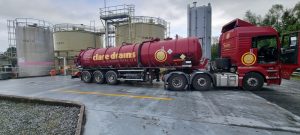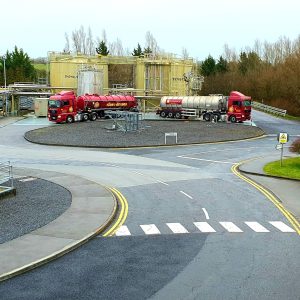Decommissioning a site in Ireland, or anywhere else, is a multifaceted process that involves careful consideration of various factors. There are numerous hazardous risks involved. Many steps in an asset decommissioning project need to be considered, this article covers one of the primary risks is which is contamination.
Why decommission?
The decision to decommission can be driven by a range of reasons, from environmental to economic.
- One of the primary reasons for decommissioning a site is to ensure that it no longer poses any environmental risks. This is particularly relevant for industrial sites where there may have been a history of pollution or hazardous waste management. Decommissioning allows for the safe decontamination and restoration of the site, potentially making the land available for new uses that can benefit the community.
- Another significant reason for decommissioning a site is the economic benefit. It may no longer be financially viable to maintain or operate an older facility, or even a single tank, especially if it requires extensive upgrades or repairs. Decommissioning such a site can free up capital for more profitable ventures or allow for the sale of the land, which can be a considerable asset.
- The process also takes into account the social impact. For instance, a decommissioned site may offer opportunities for redevelopment that can lead to job creation or the provision of much-needed services or housing. Moreover, decommissioning can be part of a broader strategy to revitalize an area, contributing to urban renewal and community development.
- From a legal and regulatory perspective, decommissioning may be necessary to comply with current environmental laws and regulations. As standards become more stringent, older sites may not meet these requirements, necessitating their decommissioning and cleanup. This ensures that the site owner adheres to legal responsibilities and avoids potential penalties or liabilities.
- Furthermore, decommissioning a site can also be a proactive measure in risk management. By decommissioning a site that is no longer in use, owners can prevent potential hazards such as accidents, spills, or other incidents that could have severe consequences for both the environment and public health.
The decommissioning process in Ireland, as in other countries, involves a series of steps to ensure that all stakeholders’ interests are considered and that the transition is managed effectively. This includes transparent decision-making, safeguarding the welfare of service users and staff, ensuring value for money, managing risks, fostering partnerships, and maintaining clear communication throughout the process.
Decommissioning a site, particularly one that has housed industrial, chemical, or nuclear operations, is a complex and risky endeavour that requires meticulous planning and execution. The process involves several risks that must be managed to protect workers, the public, and the environment. The past usage of a tank needs to be understood following the SDS assessment so that all properties of a chemical are safely considered.
Sites used for industrial processes often contain hazardous substances that can pose a threat to human health and the environment. These can include chemical, radioactive, or biological agents that were part of the operational materials or by-products. Proper identification, containment, and disposal of these materials are crucial to prevent any potential leaks or spills that could lead to soil, water, or air contamination.
There is also the risk of incomplete decommissioning. If a site is not properly decommissioned, it can leave behind residual hazards that may emerge over time, posing long-term risks to the environment and future site developments. Ensuring that the decommissioning process is thorough and complete is essential for the long-term safety and usability of the site.
A thorough decommissioning project involves planning, risk assessments and control measures which are integral to preventing environmental pollution and ensuring safety. Past relevant experience is a massive component of this process.
Whether it’s a chemical process line in industry, a complex pharmaceutical tank farm, or a food processing plant that’s being retired – decommissioning an industrial plant, and all its related equipment, is a large and important undertaking. It’s about fulfilling your obligation to restoring the environment and landscape to its former condition – and ensuring that the community around it is protected from the hazardous effects when the plant is no longer in use.
In conclusion, decommissioning a site is fraught with risks that require careful consideration and management. Each aspect must be addressed through rigorous planning, adherence to regulations, and the implementation of comprehensive safety measures. Only through such diligent efforts can the risks of decommissioning be mitigated and the site be safely repurposed or restored to its natural state.
The Professionals You Need…
At CD Environmental, we have extensive experience and skilled expertise in the safe decommissioning of industrial tanks and plants – ensuring that all chemicals and wastes are correctly and safely removed and packaged. CD Environmental’s approach is characterized by a commitment to environmental sustainability, responsible corporate practices, and a multidisciplinary approach that incorporates environmental science, engineering, economics, and social policy. By following these best practices, CD Environmental not only protects the environment and human health but also ensures the interests of all stakeholders are safeguarded during the decommissioning process.
The Planning that Counts…
The planning stage of decommissioning is vital – and we take the time to investigate all options and requirements, ensuring the appropriate cleaning methods are used to keep waste volumes as low as possible. Our asset decommissioning services include CCTV surveys, suction excavation and liquid waste management monitoring.
SECTORS FOR WHICH WE PROVIDE THESE SERVICES INCLUDE:
Pharmaceutical & Food and Manufacturing
A signature of CD Environmental is ‘getting it r ight, first time’ – professionally, skilfully, safely and efficiently.


